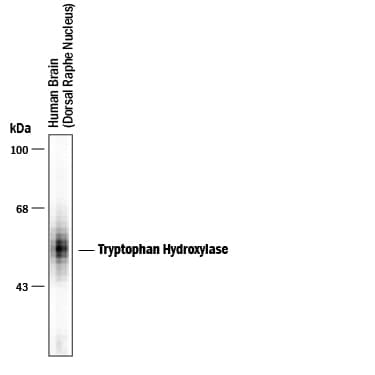Tryptophan Hydroxylase Pan Specific Antibody
R&D Systems, part of Bio-Techne | Catalog # PPS038

Key Product Details
Species Reactivity
Validated:
Multi-Species
Cited:
Mouse
Applications
Validated:
Immunohistochemistry, Western Blot
Cited:
Immunohistochemistry
Label
Unconjugated
Antibody Source
Polyclonal Sheep IgG
Product Specifications
Immunogen
Tryptophan Hydroxylase
Specificity
This antibody is specific for the ~55 kDa TPH in Western blots of human dorsal Raphe nucleus lysates. Immunolabeling has been demonstrated in rat brain lysates. Based upon the relatively high degree of homology of tryptophan hydroxylase, the antibodies should cross-react with other mammalian species. Due to antigen modifications in E. coli, this antibody does not recognize TPH in rabbit tissues.
Clonality
Polyclonal
Host
Sheep
Isotype
IgG
Scientific Data Images for Tryptophan Hydroxylase Pan Specific Antibody
Detection of Tryptophan Hydroxylase by Western Blot.
Western blot of human dorsal Raphe nucleus. As shown in the autoradiograph, the antibody is specific for the ~55 kDa TPH protein.Applications for Tryptophan Hydroxylase Pan Specific Antibody
Application
Recommended Usage
Immunohistochemistry
1:1000 dilution
Western Blot
1:1000 dilution
Sample: Human brain (dorsal Raphe nucleus)
Sample: Human brain (dorsal Raphe nucleus)
Formulation, Preparation, and Storage
Purification
Antigen Affinity-purified
Formulation
100 μL in 10 mM HEPES (pH 7.5), 150 mM NaCl, 100 μg/mL BSA and 50% glycerol.
Shipping
The product is shipped with polar packs. Upon receipt, store it immediately at the temperature recommended below.
Stability & Storage
For long-term storage, ≤ ‑20° C is recommended. Product is stable at ≤ ‑20° C for at least 1 year.
Background: Tryptophan Hydroxylase
References
- Boularand, S. et al. (1990) Nucleic Acids Res. 18:4257.
- Wang, G-A. et al. (1998) J. Neurochem. 71:1769.
- Kumer, S.C. et al. (1997) J. Neurochem. 69:1738.
- Wang, L. et al. (2002) Biochemistry 41:12569.
- Banik, U. et al. (1997) J. Biol. Chem. 272:26219.
- Haycock, J.W. et al. (2002) J. Neurosci. Methods. 114:205.
Alternate Names
TPH, TPH1
Additional Tryptophan Hydroxylase Products
Product Documents for Tryptophan Hydroxylase Pan Specific Antibody
Product Specific Notices for Tryptophan Hydroxylase Pan Specific Antibody
For research use only
